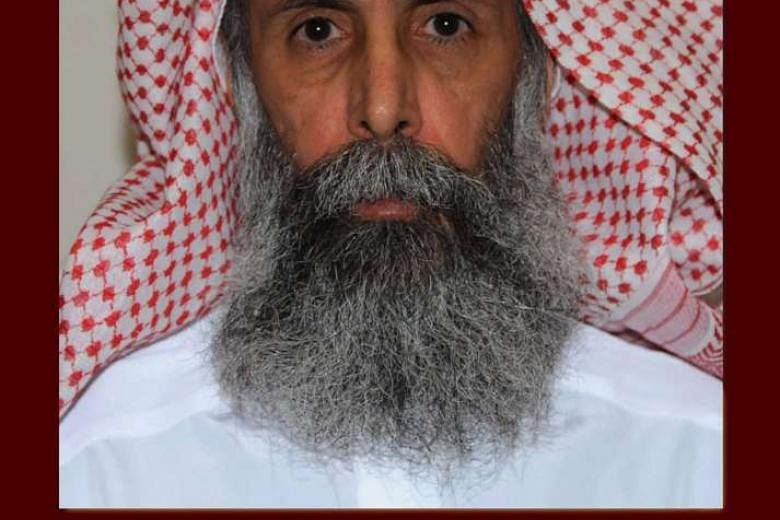DUBAI (AFP) - Shi'ite Muslim cleric Nimr al-Nimr, executed in Saudi Arabia on Saturday, was a charismatic religious leader who delivered fiery speeches demanding more rights for his minority in the Sunni-ruled kingdom.
He was a driving force of the protests that broke out in 2011 in the kingdom's east, an oil-rich region where an estimated two million Shi'ites live what they call a marginalised life.
The 56-year-old, who had travelled to Shi'ite-majority Iran to study theology following the country 1979 Islamic Revolution.
Riyadh has repeatedly accused Iran of fuelling unrest in the kingdom and across the region, and Teheran was the first to react to Nimr's death, warning that Saudi Arabia will pay "a high price" for executing him.
Nimr was shot in the thigh when he was arrested on July 8, 2012, being accused of "resisting the security forces."
The slightly built man with a long white beard and glasses, was described by the interior ministry at the time as an "instigator of sedition" and his arrest had sparked protests and clashes with police in Shi'ite towns.
His death sentence was announced on Oct 15, 2014 for sedition, disobedience and bearing arms.
Three days later, gunmen fired on a security patrol in the Shi'ite populated east, setting fire to an oil pipeline.
Speaking to AFP Saturday, Nimr's brother Mohammed described the cleric as "a humble, religious man who lived a simple life, making him attractive to many youths".
His execution "will spark anger of (Shi'ite) youths" in Saudi Arabia, said Mohammed, calling instead for a "peaceful protest movement".
Nimr returned from Iran in 1994 as a "faqih", or expert on Islamic law, and held a "special and distinct position" among Saudi Shi'ites, said Mohammed.
Prior to his arrest, he preached regular sermons. On Fridays, the Muslim weekly day of worship, his sermons took on a political hue.
He was based at Imam Hussein Mosque in Awamiya, his home village, where protests and attacks on police are common.
He was also briefly detained on multiple occasions between 2003 and 2008 over his demands for the release of activists, allowing Shi'ite teaching in schools and giving Shi'ites more rights, according to his official website www.sknemer.com, which is run by his family.
But it was in 2009 when he seriously angered authorities by calling for Eastern Province's Shi'ite-populated Qatif and Al-Ihsaa governorates to be separated from Saudi Arabia and united with neighbouring Shi'ite-majority Bahrain.
Speaking in November 2011, after four Shi'ites were shot dead in Eastern province, Nimr demanded the "release of all those detained in the protests, and all prisoners of conscience - Sunnis and Shi'ites".
Speaking at the funeral of one of the protesters, Nimr said: "We are determined to demand our legitimate rights by peaceful means".
The last straw was in a video circulated on social media in 2012 in which Nimr made a speech celebrating the death of interior minister Prince Nayef bin Abdulaziz.
"Let the worms eat him," Nimr had said, also criticising the ruling Sunni families in both Saudi Arabia and neighbouring Bahrain, where authorities crushed a Shi'ite-led protest movement in 2011 with the help of Saudi troops.
Nayef's powerful son, Mohammed bin Nayef, became crown prince last year.
The cleric's brother told AFP it is "unfortunate that the verdicts would be closer to personal revenge" by Nayef rather than based on criminal proof.
Nimr spoke "words which may have been harsh, but he was voicing an opinion. He could have been held accountable for it politically" and not executed.
The cleric's wife died of cancer in 2012. He was the father of one son and three daughters.
His children are studying in the United States with the exception of a teenage daughter, who lives in Saudi Arabia.
Mohammed's son, Ali al-Nimr, whose arrest at the age of 17 and alleged torture during detention sparked condemnation from rights watchdogs and the United States, is also facing the death penalty.

